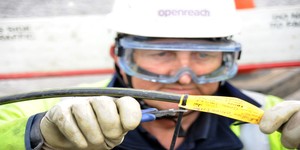
Ofcom, the UK communications watchdog, has published its Infrastructure Report 2014 in which it warns that there are areas of the UK which will not be fully served by the current communications market as its stands today.
As part of its work monitoring the UK's communications infrastructure, Ofcom has prepared annual reports since 2011. Its most recent report includes a start warning: 'the economics of networks means there are parts of the UK that will not be fully served by the market. There are also some services which may not be provided to all by the market,' it continued, referring to rural regions and the figures which show three per cent of the country's population still lacks access to basic broadband provision - meaning access to speeds of less than 2Mb/s.
'n these circumstances, Ofcom or the Government may intervene to further consumer and citizen interests,' the report warned, stating 'communications services are critical to the UK’s economic success and social cohesion' and that 'they are used by the average UK adult for over half of their waking hours. Who takes action, and how, depends on the levers available. For example, Ofcom has moved to improve mobile coverage by attaching coverage obligations to mobile licences. The Government has intervened to improve the coverage of mobile networks and superfast broadband through public funding to subsidise wider roll-out.'
The report itself is designed to provide 'an accurate and up to date understanding of the state of the UK's infrastructure,' required ' to ensure that it is precisely targeted, so that it is an efficient means of achieving the policy goal, and at the same time minimises the risk of knock-on effects that could reduce competition or private sector investment.' It is, however, publicly available (PDF warning) for all to peruse.
The latest figures show that fixed-line broadband is 'almost universally available,' aside from the aforementioned three per cent of have-nots, with an average downstream speed of 23Mb/s. However, 15 per cent lack access to speeds above 10Mb/s, and while 75 per cent of premises - not population - have access to speeds greater than 30Mb/s only 21 per cent have chosen to take advantage of this access. Most interesting is the claim that 27 per cent of households 'still do not take a fixed[-line] broadband connection of any kind, with Ofcom suggesting that 3G and 4G mobile broadband is increasing in popularity but that around 18 per cent of households have no home access to the internet at all.
The full report is available on the Ofcom website (PDF warning).
As part of its work monitoring the UK's communications infrastructure, Ofcom has prepared annual reports since 2011. Its most recent report includes a start warning: 'the economics of networks means there are parts of the UK that will not be fully served by the market. There are also some services which may not be provided to all by the market,' it continued, referring to rural regions and the figures which show three per cent of the country's population still lacks access to basic broadband provision - meaning access to speeds of less than 2Mb/s.
'n these circumstances, Ofcom or the Government may intervene to further consumer and citizen interests,' the report warned, stating 'communications services are critical to the UK’s economic success and social cohesion' and that 'they are used by the average UK adult for over half of their waking hours. Who takes action, and how, depends on the levers available. For example, Ofcom has moved to improve mobile coverage by attaching coverage obligations to mobile licences. The Government has intervened to improve the coverage of mobile networks and superfast broadband through public funding to subsidise wider roll-out.'
The report itself is designed to provide 'an accurate and up to date understanding of the state of the UK's infrastructure,' required ' to ensure that it is precisely targeted, so that it is an efficient means of achieving the policy goal, and at the same time minimises the risk of knock-on effects that could reduce competition or private sector investment.' It is, however, publicly available (PDF warning) for all to peruse.
The latest figures show that fixed-line broadband is 'almost universally available,' aside from the aforementioned three per cent of have-nots, with an average downstream speed of 23Mb/s. However, 15 per cent lack access to speeds above 10Mb/s, and while 75 per cent of premises - not population - have access to speeds greater than 30Mb/s only 21 per cent have chosen to take advantage of this access. Most interesting is the claim that 27 per cent of households 'still do not take a fixed[-line] broadband connection of any kind, with Ofcom suggesting that 3G and 4G mobile broadband is increasing in popularity but that around 18 per cent of households have no home access to the internet at all.
The full report is available on the Ofcom website (PDF warning).

MSI MPG Velox 100R Chassis Review
October 14 2021 | 15:04








Want to comment? Please log in.